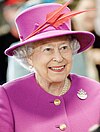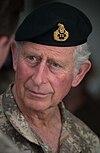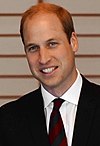Education of the British Royal Family
| Royal family of the United Kingdom and the other Commonwealth realms |
|---|
 |
|
The Education of the British Royal Family is the method and extent of the education of the British Royal Family.
History[edit]
According to The Independent, the "royal family is not known for its intellectualism".[1]
From the 18th to the mid-20th century, heirs to the British throne were educated in emulation of French royal custom. A governor and a preceptor were appointed for the child when it was of sufficient age, the former responsible for lessons concerning morality and the latter for lessons concerning academic subjects. During this period ideas about appropriate education for the royal family have also changed.[2] The reigning queen, Elizabeth II, was the last member of the royal family to be educated by tutors in the traditional manner.[3] She was "home-schooled in history by the provost of Eton, and speaks French fluently."[1]
George VI, the current Queen's father, attended the Royal Naval College Osborne, then used as a junior officer training facility for students of secondary school age; he finished at the bottom of his class. He studied for one year at the University of Cambridge, but did not complete an undergraduate degree.[4]
Queen Elizabeth's sons were educated at public schools. Prince Charles was educated at Gordonstoun, a Scottish public school, and the University of Cambridge. His graduation from Cambridge in 1970 marked the first time in British history that a British monarch or heir to the throne had completed a university degree.[5][6]
Prince Harry does not have a university degree.[7] Prince Andrew, Duke of York's daughters, Eugénie and Beatrice, in 2008 were noted as having earned the best grades so far in the Royal Family in their A-levels, better than their father and uncle, and than their older cousins Harry and William.[1] Eugénie ranked first with her two As and a B in art, English literature, and history of art from Marlborough College.[1]
Educational credentials[edit]
The following list summarizes the educational credentials of the first five adult members in the current line of succession to the British throne.
| Name | Secondary school | Undergraduate university | Notes | |
|---|---|---|---|---|
 Queen Elizabeth |
none (private tutors)[8] | none | ||
 Charles, Prince of Wales |
Gordonstoun[5] A-level grades: B (history), C (French)[1] |
Bachelor of Arts – History University of Cambridge[5] Grade: 2:2 |
||
 William, Duke of Cambridge |
Eton College[9] A-level grades: A (geography), B (art history), C (biology)[1] |
Master of Arts (Scotland) – Geography University of St Andrews[9] Grade: 2:1 |
Also completed a 10-week certificate in agriculture at the University of Cambridge.[9] | |
 Henry of Wales |
Eton College[10] A-level grades: B (art), D (geography) [1] |
none | Also completed commissioning course at Royal Military Academy Sandhurst.[10] | |
| File:Prince Andrew August 2014 (cropped).jpg Andrew, Duke of York |
Gordonstoun[11] | none | Also completed commissioning course at Britannia Royal Naval College.[12] | |
Assessment[edit]
Edward VII[edit]

King Edward VII, Queen Elizabeth's great-grandfather, briefly attended the University of Edinburgh, University of Oxford, and University of Cambridge, but did not graduate from any of them.[13] Dennis Judd, professor of British history at London Metropolitan University has opined that "there is no evidence" Edward's brief time at these universities "did much good" and William Ewart Gladstone said of the king that he "knew everything except what is in books".[13] John Neale Dalton, one of Edward's tutors, surmised of the future king that he had a "weakness of brain, this feebleness and lack of power to grasp almost anything put before him", while another tutor, J.K. Stephen, determined there was no use for Edward to attend university at all since he was unable to understand the words he was reading.[14] As a "tribute to his birth, rather than his intellect" he was granted an honorary LL.D.[14]
Elizabeth II[edit]
Historian David Starkey described Elizabeth II in 2007 in his series Monarchy as poorly learned, comparing her cultural refinement and intellectual curiosity to that of a "housewife". [15][16] According to The Telegraph, his comments prompted rebuttals from several sources: Penny Junor, royal biographer, said: "The Queen is certainly cultured even if not that moved by the arts. The Prince of Wales has a great sense of history and a lot of that comes from his mother."[16] Marco Houston, editor of Royalty Monthly Magazine, said that Elizabeth "may not have had the best formal education, but she has had the best education at the university of life".[17]
William, Duke of Cambridge[edit]
The decision by the University of Cambridge to admit William, Duke of Cambridge to a vocational course in agriculture management was criticized by some, who said his entry was a "free pass" and "insult" to other Cambridge students; however, others noted the vocationally-oriented course was open to anyone from the "posh set" and not just royalty.[18][19] Cambridge's student newspaper The Tab initially criticized William's admission, questioning whether his grades were sufficient to attend the university. Later its writer backtracked, noting that the course was a short vocational certification and that the university customarily admitted most applicants to it.[20][21]
Diana, Princess of Wales[edit]
Monica Ali and Princess Michael of Kent have both criticized Diana, Princess of Wales as "uneducated" while Diana's immediate family members frequently referred to her as "the thick one".[22][23][24] Diana repeatedly failed her O-level examinations (equivalent of a high school diploma in the United States[25]) and later dropped out of school.[26] John Lanchester, however, has rebutted criticism of Diana by saying that, while failure on Diana's scale would normally mean one was "astoundingly stupid", Diana had intentionally avoided academic pursuits as part of a master plan not to "put a royal suitor off".[27] (Diana's O-level exam notes were later discovered; in them she wrote about the "genious" [sic] of William Shakespeare and a philosopher she identified as "Aristocktile", but possibly meant Aristotle).[28]
References[edit]
- ↑ 1.0 1.1 1.2 1.3 1.4 1.5 1.6 Guest, Katie (23 August 2008). "Top marks for Eugenie as her exam results break all royal records". The Independent. Retrieved 30 March 2016.
- ↑ Peter Gordon, Denis Lawton, Royal Education: Past, Present, and Future, Psychology Press, 2003, pp. 12-13
- ↑ Clarke, M.J. (February 1978). "The Education of Royalty in the Eighteenth Century: George IV and William IV". British Journal of Educational Studies. 26 (1): 85–87.
- ↑ Bradford, Sarah (1989). King George VI. London: Weidenfeld and Nicolson. ISBN 0-297-79667-4. Search this book on

- ↑ 5.0 5.1 5.2 "The Prince of Wales – Education". royal.gov.uk. The Royal Family. Retrieved 30 March 2016.[dead link]
- ↑ "Education". princeofwales.gov.uk. The Prince of Wales. Retrieved 14 April 2016.
- ↑ Cowell, Alan (7 September 2003). "Britain's Upper Crust Still Soldiers On". New York Times. Retrieved 20 April 2106. Check date values in:
|accessdate=(help) - ↑ "Her Majesty the Queen – Education". royal.gov. The Royal Family. Retrieved 30 March 2016.[dead link]
- ↑ 9.0 9.1 9.2 "Prince William". biography.com. Biography. Retrieved 30 March 2016.
- ↑ 10.0 10.1 "Prince Harry". biography.com. Biography. Retrieved 30 March 2016.
- ↑ "Gordonstoun turns back clock to a golden age of cold showers (but would Prince Charles agree?) 22:52Monday 27 April 200901:27Tuesday 28 April 2009". The Scotsman. 27 April 2009. Retrieved 14 April 2016.
- ↑ "Naval Career". thedukeofyork.org. The Duke of York. Retrieved 14 April 2016.
- ↑ 13.0 13.1 Judd, Dennis (2012). George VI. I.B.Tauris. pp. 46–47. ISBN 178076071X. Search this book on

- ↑ 14.0 14.1 Hibbert, Christopher (2007). Edward VII: The Last Victorian King. Palgrave Macmillan. ISBN 9780230610750. Search this book on

- ↑ Edemariam, Aida (22 December 2007). "Queen is poorly educated and philistine, says Starkey". The Guardian. Retrieved 30 March 2016.
- ↑ 16.0 16.1 Sawer, Patrick (23 December 2007). "Historian David Starkey criticises the Queen". Daily Telegraph. Retrieved 14 April 2016.
- ↑ Boztas, Senay (22 December 2007). "Starkey Dubs YouTube Queen an Uneducated Housewife". The Independent. Retrieved 14 April 2016.
- ↑ Puente, Maria (3 January 2014). "Are Prince William's grades good enough for Cambridge?". USA Today. Retrieved 14 April 2016.
- ↑ "Why Prince William is right to go back to school". CNN. 8 January 2014. Retrieved 14 April 2016.
- ↑ "Cambridge student newspaper backtracks on Prince William criticism". ITV. 7 January 2014. Retrieved 14 April 2016.
- ↑ Tatko-Peterson, Ann. "Prince William not smart enough for Cambridge University?". San Jose Mercury News. Retrieved 14 April 2016.
- ↑ "Diana tapes: Princess thought she was 'thick.'". Hurriyet Daily News. Associated Press. 2 December 2004. Retrieved 15 April 2016.
- ↑ Ali, Monica (30 March 2011). "Royal rebel: the legacy of Diana". The Guardian. Retrieved 15 April 2016.
- ↑ Joshi, Priay (26 January 2014). "Princess Michael of Kent: Princess Diana was 'Uneducated' and Older Royals 'Boring'". Yahoo. International Business Times. Retrieved 15 April 2016.
- ↑ "Equivalent Degrees". indiana.edu. Indiana University. Retrieved 20 April 2016.
- ↑ "Famous high school dropouts". WLWT-TV. 18 September 2013. Retrieved 15 April 2016.
- ↑ Lanchester, John (25 June 2007). "The Naked and the Dead". New Yorker. Retrieved 15 April 2016.
- ↑ "Princess Diana's O-level notes dumped in rubbish". Times of India. Retrieved 15 April 2016.
Further reading[edit]
- Gordon, Peter; Lawton, Denis (2003), Royal Education: Past, Present, and Future, Psychology Press, ISBN 9780714683867, ISSN 1462-2076
This article "Education of the British Royal Family" is from Wikipedia. The list of its authors can be seen in its historical. Articles copied from Draft Namespace on Wikipedia could be seen on the Draft Namespace of Wikipedia and not main one.
